|
April 2021 | Bulletin num.132 |
Subscribe
|

The dangerous cycle of counterfeits1. Impact of industrial property infringements Industrial property crimes refer to the infringement of industrial property rights duly registered with the SPTO, with the knowledge that an infringement is being carried out, with the intention of infringing the registered right and for profit. Such a form of infringement is known in commonly as forgery. The significance of counterfeits lies in the fact that the identification and guarantee functions of industrial property rights are violated, mainly the trademark. Very often, these are not isolated offenses but are committed by organized criminal groups, which are also active in other serious crime areas. These crimes cause economic damage and undermine the reputation of legitimate businesses, leading to serious losses not only for businesses, but also a substantial loss of tax revenue. More importantly, counterfeit products can pose a serious threat to the health and safety of consumers. 2. Links with organized crime There is growing evidence of the participation of organized crime groups in the violation of industrial property rights, as they are crimes whose commission is practically unscathed. Studies have shown that counterfeiting high return on investment and a relatively lighter punishment (shorter prison terms, lower fines) compared to other illegal activities such as drug trafficking, labor exploitation, cybercrime, document fraud and money laundering. That is why the latest reform of the Spanish Penal Code in this matter increased the volume of penalties, graduating offending behaviors according to their severity. At the most serious level, the foreseen penalty (3 years) allows the use of European crime prosecution instruments, such as the European Arrest and Surrender Order and the use of Undercover Agents, among others. All of the above have been used in order to prosecute of these organized mafias. 3. Protection of the health and safety of citizens Counterfeit products (such as toys, food / beverages, cosmetics, pesticides, as well as counterfeit pharmaceuticals) pose serious health and safety risks for citizens, as they do not always meet quality and safety standards and may contain dangerous ingredients or components. Medications to treat serious diseases are prone to counterfeiting, with life-threatening consequences for patients. The COVID-19 pandemic is providing more opportunities for organized crime groups that manufacture and distribute counterfeit products. These flexible groups take advantage of the increased demand for relevant products such as personal protective equipment and test kits. They take advantage of citizens' uncertainty about emerging treatments and vaccines. Additionally, law enforcement officers are not only faced with counterfeit vaccines, disinfectants, and masks, but must also deal with corruption, theft, scams, and other related fraud. 4. Protection of companies against economic losses Crimes against industrial property represent a significant cost to the economy and society. It has an impact on the legitimate interests of economic operators, including small and medium-sized enterprises, and hinders a level playing field in the market. 5. Deterioration of the environment Environmental damage can result from the production, use, and disposal of counterfeit products, ex. fake pesticides and chemicals. One enforcement initiative to address this problem is Operation Silver Axe, coordinated by EUROPOL, which started in 2012 and now includes nearly 30 countries around the world. Since its launch, authorities have seized 1,222 tons of illegal and counterfeit pesticides, herbicides, and fertilizers. Due to its links to organized crime, in order to ensure the protection of the health and safety of citizens, safeguard companies from economic losses, and help post-pandemic economic recovery, it is important that industrial property is protected and that crimes against industrial property are recognized as a priority.
|
Table of contentsWe launched a roadmap for 2021-2024 with our Strategic Plan of the SPTO!Commitment of the Government of Spain to Intellectual and Industrial Property rights as mechanisms to stimulate creation, innovation, and technological and scientific developmentCelebration of the 10th anniversary of the TRANSFIERE Forum in MalagaNew WIPO Tool: WIPO SequenceBlogAyudas financieras y subvenciones para pymes y emprendedores que apuestan por la protección de sus innovaciones en forma de patentes o modelos de utilidad |